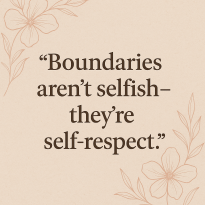Part 9: How to Set Boundaries That Protect Your Time, Energy, and Emotional Well-Being
Because without boundaries, burnout is inevitable.
It’s possible to manage a demanding job, support loved ones, and keep up with responsibilities—yet still feel stretched thin, emotionally depleted, and always behind.
When every role demands attention and everything feels urgent, something critical often goes missing: margin.
Boundaries are how margins are created.

They’re not about shutting people out or doing less—they’re about directing energy where it truly matters. In a world that rewards hustle and hyper-availability, boundaries help maintain alignment, clarity, and peace.
If life feels like it’s running you instead of the other way around, it’s time to draw the line, not out of defiance—but out of wisdom.
 Why Boundaries Are Non-Negotiable
Why Boundaries Are Non-Negotiable
Energy, like time, is finite. It drains with every email responded to after hours, every obligation taken on without thought, and every moment spent reacting instead of choosing.
While it’s tempting to wait for life to “settle down,” clarity and peace rarely arrive on their own. They must be protected—through deliberate, firm, and compassionate limits.
Boundaries preserve what’s important. They protect focus, support rest, and make space for intentional living. And without them, burnout is only a matter of time.
Below are five core boundary zones that directly affect energy, clarity, and overall well-being—plus real-life guidance on how to reinforce each one in daily life.

 Boundaries Around Time: Redefine What’s Truly Urgent
Boundaries Around Time: Redefine What’s Truly Urgent
Time is precious—but without clear limits, it quietly gets claimed by everything except what truly matters.
That’s how the day slips away in a blur of back-to-back Zoom calls, spontaneous errands, and “quick” favors that turn into hour-long detours. You start the morning with a mental list of priorities, but by evening, you’ve responded to everyone else’s fires—and barely touched what you intended to do for yourself.
Here’s what that often looks like:
- You sit down to plan your week, but your calendar is already filled with other people’s deadlines, school meetings, or family obligations.
- A colleague sends you a “quick task” at 4:30 PM, and suddenly you're working late—again.
- You say yes to yet another WhatsApp group committee, even though you’re already drained.
- You stay up late scrolling or binge-watching, not out of rest—but because it’s the only time that feels like yours.
Over time, this pattern steals more than just hours. It chips away at your peace of mind, your energy, and even your identity. You feel tired—not just physically, but emotionally… as if your life is happening around you, but not with you.
That’s why boundaries and intentional planning aren’t just productivity tools—they’re self-respect in action.
To reclaim your time, you must start by guarding it. Say yes with purpose. Say no with clarity. And remember: not everything urgent is important—and not everything important is urgent.
Try this:
- Block your non-negotiable time first—rest, family, focus
- Create buffer zones between meetings or high-effort tasks
- Practice deferring requests without guilt:
- “Yes, I can help—but next Thursday works best.”

 Boundaries Around Mental & Emotional Load: Make the Invisible Visible
Boundaries Around Mental & Emotional Load: Make the Invisible Visible
Emotional labor isn’t always seen—but it’s constantly felt.
It’s not listed on your calendar. It doesn’t show up in your to-do list. But it’s there—running in the background, consuming energy quietly but consistently.
It’s the invisible checklist you carry:
- Remembering your partner’s work presentation so you can cheer them on at the right moment.
- Keeping mental tabs on your child’s changing school schedule and making sure they have the right supplies packed every morning.
- Noticing when someone at work seems off and offering support—even when your own tank is running low.
- Navigating family dynamics gently, making sure everyone feels included, seen, and cared for.
- Softening your tone, overexplaining, or smoothing conflict so others can stay comfortable—often at your own expense.
This kind of labor doesn’t have a clock-in time or a compensation plan. It’s the emotional glue that holds everything together—but it often leaves you feeling like you’re coming undone.
And what makes it harder? It’s rarely acknowledged. You may be praised for your productivity or your resilience, but not for the emotional load you carry to keep things functioning behind the scenes.
Over time, unspoken emotional labor leads to depletion. You might find yourself irritable, resentful, or disconnected—without fully understanding why.
That’s why setting boundaries around emotional energy is just as vital as managing your time. Not every emotion is yours to carry. Not every fire is yours to put out.
Boundaries aren’t walls—they’re gates. They allow what’s healthy in, and keep what’s draining out.
So ask yourself:
- Where are you doing invisible emotional work no one sees—but everyone benefits from?
- What small shifts can you make to delegate, pause, or simply not hold what’s not yours?
Because your peace matters too. And you deserve space—not just to support others—but to be supported.
You may need this boundary if:
- There’s no mental downtime—even when physically resting
- Tasks keep piling up in your mind with no space to unload
- You feel resentful about carrying things no one else notices
Try this:
- Journal or list everything you’re mentally managing
- Delegate recurring, invisible tasks where possible
- Ask, “Is this mine to carry?” before automatically taking it on

Mental Load Organizer Journal
Set Boundaries, Find Peace by Nedra Tawwab
 Set Time Limits for Work and Rest
Set Time Limits for Work and Rest
Because endless availability leads to eventual burnout.
When work hours bleed into evenings and weekends, and rest becomes something you “earn” instead of something you need, it’s a clear sign your boundaries have been breached.
Maybe you find yourself checking emails at midnight—not because you want to, but because it's become a habit. Or maybe your day "technically" ends at 5:00 PM, but you're still thinking about that unfinished report during dinner. And rest? It’s become reactive—collapsing on the couch after running on empty, rather than creating intentional space for restoration.
Here’s the truth: without time boundaries, life becomes a blur—a constant output of doing, with little time for being.
Try this:
- Pick a firm “log-off” time and treat it like a meeting with yourself.
- Schedule rest the same way you schedule productivity. It’s not indulgent—it’s intelligent.
- Use visual cues like a closed laptop, a post-work shower, or a walk to signal the transition from “work mode” to “home mode.”
Boundaries around time aren’t limitations—they’re lifelines. They remind you that you are more than what you produce. You deserve time to decompress, reset, and simply exist—without needing to justify it.
 Create Space for Your Own Needs
Create Space for Your Own Needs
Constantly prioritizing others leaves no room for yourself.

If your day starts with attending to others’ needs and ends without a single moment carved out for yourself, you’re not alone. Many quietly live this cycle: solving everyone else’s problems, fulfilling every request, keeping everything running… and forgetting they’re a person too.
This boundary breach doesn’t scream. It whispers:
- Skipping meals because you're “too busy.”
- Putting off your medical appointments to fit someone else’s schedule.
- Feeling guilty for wanting alone time, even when you're clearly depleted.
But here's a gentle truth: you cannot pour from an empty cup.
Your needs matter—whether or not someone else sees them.
Start small:
- Name one thing that energizes you—and protect time for it.
- Acknowledge your desires without judgment.
- Let rest, joy, and stillness be legitimate parts of your daily rhythm.
You are allowed to take up space. Your needs are valid, even if no one else is voicing them. Creating space for yourself isn’t selfish—it’s foundational.
 Build Courage to Say No (and Mean It)
Build Courage to Say No (and Mean It)
Because “yes” without intention leads to regret.
Saying yes when you mean no is one of the quickest paths to resentment.
But many avoid “no” because they fear disappointing others, being seen as difficult, or losing opportunities.

Here’s what’s often missed: every “yes” costs you something. Your energy. Your time. Your presence elsewhere.
The habit of overcommitting usually stems from old stories:
- “I have to prove I’m reliable.”
- “If I say no, they’ll stop including me.”
- “It’s easier to just do it myself than explain why I can’t.”
But those beliefs come at a high cost—your well-being.
Learning to say no, clearly and kindly, is an act of leadership in your own life.
Practice scripts like:
- “Thanks for thinking of me, but I’m not available for that right now.”
- “I appreciate the opportunity, but I have to pass this time.”
- “I need to protect my time this week and won’t be able to help.”
Remember: you’re not rejecting people—you’re respecting your limits.
And the more you say no to what drains you, the more capacity you have to say yes to what truly matters.

You don’t need to earn rest. You need to protect it.
Saying no isn’t rejection—it’s redirection toward what matters.
Boundaries don’t push people away. They invite clarity into relationships.

Part 10 – Digital Behavior: You Don’t Work for Your Phone
We’ll explore how attention is being hijacked, and how to reclaim mental space from devices that drain more than they deliver.
If you missed the last article on part 8, in this series, you can read it here: From Busy to Aligned - How to take back Your Time and Energy



